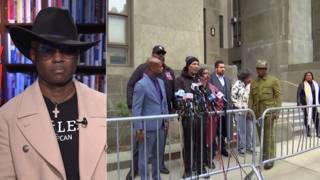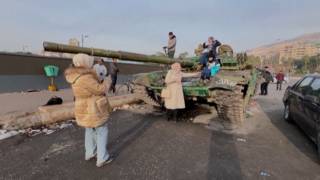
Related
In Part Two of our debate, former Israeli Foreign Minister Shlomo Ben Ami and scholar Norman Finkelstein address the intricacies of a question that has been the subject of much debate–what happened at the Camp David peace talks in July 2000? Both sides of the Israel-Palestinian conflict say the other rejected peace, leading to the violence that has marked the conflict since. Ben Ami — who was a leading member of the Israeli negotiation team — says he would have rejected Camp David if he were a Palestinian, and discusses the ensuing peace talks in Taba in January 2001. [includes rush transcript]
Transcript
AMY GOODMAN: We continue today with the debate between Professor Norman Finkelstein and former Israeli Foreign Minister, Shlomo Ben-Ami. Since the outbreak of the latest Palestinian Intifada in the fall of 2000, the subject of what happened during the final round of peace talks at Camp David in July 2000 and at Taba in January 2001 has been the subject of much debate. The Israeli government and its supporters have blamed the Palestinians for rejecting what they say was a generous offer that would have given them a viable state. The Palestinians say Israel never made an offer that even approaches meeting their minimal rights. Each side has used the other’s alleged position to assign blame for the violence that’s plunged the conflict into deeper chaos. We begin this part of the debate with Professor Norman Finkelstein, talking about the peace talks at Camp David in July 2000.
NORMAN FINKELSTEIN: My concern is let’s look at the diplomatic record, the factual record. What were the offers being made on each side of the Camp David and in the Taba talks? And the standard interpretation, which comes — which is — you can call it the Dennis Ross interpretation, which, I think, unfortunately Dr. Ben-Ami echoes, is that Israel made huge concessions at Camp David and Taba; Palestinians refused to make any concessions, because of what Dr. Ben-Ami repeatedly calls Arafat’s unyielding positions; and that Arafat missed a huge opportunity. Now, it is correct to say that if you frame everything in terms of what Israel wanted, it made huge concessions. However, if you frame things in terms of what Israel was legally entitled to under international law, then Israel made precisely and exactly zero concessions. All the concessions were made by the Palestinians.
Briefly, because we don’t have time, there were four key issues at Camp David and at Taba. Number one, settlements. Number two, borders. Number three, Jerusalem. Number four, refugees. Let’s start with settlements. Under international law, there is no dispute, no controversy. Under Article 49 of the Fourth Geneva Convention, it’s illegal for any occupying country to transfer its population to Occupied Territories. All of the settlements, all of the settlements are illegal under international law. No dispute. The World Court in July 2004 ruled that all the settlements are illegal. The Palestinians were willing to concede 50% — 50% of the Israeli settlements in the West Bank. That was a monumental concession, going well beyond anything that was demanded of them under international law.
Borders. The principle is clear. I don’t want to get into it now, because I was very glad to see that Dr. Ben-Ami quoted it three times in his book. It is inadmissible to acquire territory by war. Under international law, Israel had to withdraw from all of the West Bank and all of Gaza. As the World Court put it in July 2004, those are, quote, “occupied Palestinian territories.” Now, however you want to argue over percentages, there is no question, and I know Dr. Ben-Ami won’t dispute it, the Palestinians were willing to make concessions on the borders. What percentage? There’s differences. But there is no question they were willing to make concessions.
Jerusalem. Jerusalem is an interesting case, because if you read Dr. Ben-Ami or the standard mainstream accounts in the United States, everyone talks about the huge concessions that Barak was willing to make on Jerusalem. But under international law Israel has not one atom of sovereignty over any of Jerusalem. Read the World Court decision. The World Court decision said Jerusalem is occupied Palestinian territory. Now, the Palestinians were willing, the exact lines I’m not going to get into now — they are complicated, but I’m sure Dr. Ben-Ami will not dispute they were willing to divide Jerusalem roughly in half, the Jewish side to Israel, the Arab side to the Palestinians.
And number four, refugees. On the question of refugees, it’s not a dispute under international law. Remarkably, even fairly conservative human rights organizations like Amnesty International, Human Rights Watch, in 2000, during the Camp David talks, they issued statements on the question of the right of return. And they stated categorically, under international law every Palestinian, roughly five to six million, has the right to return, not to some little parcels, 1% of Israel, which Israel is about — which Israel would swap, return to their homes or the environs of their homes in Israel. That’s the law. Now, Dr. Ben-Ami will surely agree that the Palestinians were not demanding and never demanded the full return of six million refugees. He gives a figure of 4-800,000. In fact — I’m not going to get into the numbers, because it’s very hard to pin it down — other authors have given figures of the tens of thousands to 200,000 refugees returning. That’s well short of six million.
On every single issue, all the concessions came from the Palestinians. The problem is, everyone, including Dr. Ben-Ami in his book — he begins with what Israel wants and how much of its wants it’s willing to give up. But that’s not the relevant framework. The only relevant framework is under international law what you are entitled to, and when you use that framework it’s a very, very different picture.
AMY GOODMAN: If you can bear to make this response brief, Dr. Shlomo Ben-Ami.
SHLOMO BEN-AMI: Yes, yes. Okay, the last third part of the book, as Dr. Finkelstein says, there is the diplomat, and this same diplomat still behaves in a way as a historian when he says in this book that Camp David was not the missed opportunity for the Palestinians, and if I were a Palestinian I would have rejected Camp David, as well. This is something I put in the book. But Taba is the problem. The Clinton parameters are the problem, because the Clinton parameters, in my view —
NORMAN FINKELSTEIN: Maybe you could explain to them what that is. I don’t think most people will know the Clinton parameters.
SHLOMO BEN-AMI: Well, the Clinton parameters say the following. They say that on the territorial issue, the Palestinians will get 100% of Gaza, 97% of the West Bank, plus safe passage from Gaza to the West Bank to make the state viable. There will be a land swap. The 97%, which I mentioned, takes into account the land swap, where they will get 3% on this side, within the state of Israel, so we will have the blocks of settlements and they will be able to settle refugees on this side of the border.
About Jerusalem, it says what is Jewish is Israeli, and what is Palestinian is — sorry, and what is Arab is Palestinian. It includes full-fledged sovereignty for the Palestinians on Temple Mount, on the Haram al-Sharif, no sovereignty, no Jewish sovereignty on the Haram al-Sharif, which was at the time and continues to be a major, major problem for Israelis and Jews, that these things mean to them a lot. And then, with the question of refugees, it says that the refugees will return to historic Palestine, to historical Palestine, and that Israel will maintain its sovereign right of admission. That is, it will have to absorb a number of refugees but with restrictions that need to be negotiated between the parties. But the bulk of the refugees will be allowed to return to the state of Palestine. This is the essence of the Clinton parameters.
What Dr. Finkelstein said here about international law, I want to make it clear, it is important, it is vital for a civilized community of nations to have an axis of principles based on international law, around which to run the affairs of our chaotic world. It is very important. It is vital, etc. But at the same time, when you go into political issues, and you need to settle differences, historical differences, differences that have to do with political rights, security concerns, historical memories, etc., it is almost impossible to do things on the basis of international law, but rather, on something that is as close as possible to the requirements of international law. The very fact that, as Dr. Finkelstein rightly says, the Palestinians were ready to make this or that concession is the reflection of them understanding that there is no viability, there is no possibility really to reach an agreement that says let us apply automatically and rigidly the requirements of international law.
AMY GOODMAN: Former Israeli Foreign Minister, Shlomo Ben-Ami, debating Norman Finkelstein in our Firehouse studio. We moved our discussion then to the last time Israelis and Palestinians met for peace negotiations in the Egyptian resort town of Taba in January 2001. This is Norman Finkelstein.
NORMAN FINKELSTEIN: What actually happened? What actually happened was exactly as what was announced by the White House spokesman on January 3rd, 2001, the official statement was both the Israelis and the Palestinians have accepted the Clinton parameters with some reservations. Both sides entered reservations on the Clinton parameters. Dr. Ben-Ami leaves out in the book both sides. He only mentions the reservations by the Palestinians.
Number two, I was surprised to notice one of the books Dr. Ben-Ami recommends is the book by Clayton Swisher called The Truth at Camp David. I looked in the book. On page 402 of Clayton Swisher’s book, when he’s discussing the issue of entering reservations to Clinton’s parameters, he quotes none other than Shlomo Ben-Ami. You acknowledged — you call them relatively minor, but you acknowledged that Barak entered — you called it several pages of reservations. In fact, Barak sent a ten-page letter of reservations to the Clinton parameters. It was exactly symmetrical. Both the Israelis and the Palestinians agreed to the Clinton parameters with some reservations.
Wait, one last point. One last point. Dr. Ben-Ami left out another crucial point in his account. He doesn’t tell us why Taba ended. It ended officially when Barak withdrew his negotiators. It wasn’t the Palestinians who walked out of Taba. It ended with the Israelis walking out of Taba, a matter of historical record, not even controversial.
AMY GOODMAN: Dr. Ben-Ami.
SHLOMO BEN-AMI: Okay, well. You see, as somebody who was a part of those who prepared the Israeli document that was submitted to President Clinton, I can say that the bulk of the document was an expression of our — the comparison that we made between our initial positions and what was reflected in the Clinton parameters. It was not a series of reservations. It was basically a mention of the difference, the way that we have gone. This was an attempt to impress the President, more than an attempt to say that these are reservations, sine qua nons. There were no real reservations in our document, whereas in the Palestinian document, there were plenty of them, with the refugees, with the Haram al-Sharif, with what have you. I mean, it was full of reservations from beginning to end. Ours was not a document about reservations, it was a statement, basically, that said these were our positions, this is where we stand today. we have gone a very long way, we cannot go beyond that. This was essentially what we sent.
Now, with regard to Taba, you see, we were a government committing suicide, practically. Two weeks before general elections, the chief of staff, General Mofaz, who is now the Minister of Defense, comes and in a — I say that in the book — in something that is tantamount to a coup d’etat, comes and says publicly that we are putting at risk the future of the state of Israel by assuming the Clinton parameters, and we accept them, we assume them. And then I go to Cairo and I meet President Mubarak, and President Mubarak invites Arafat to see me in Cairo, and I say to Arafat, “We are going to fine tune this in a meeting in Taba, if you wish.” And then we go to Taba, and we negotiate in Taba. And in Taba, Prime Minister Barak instructs me to conduct secret negotiations with Abu Alla. Within the negotiations, we had the second track trying to reach an agreement, and he even agrees to all kind of things that he was not very open to before that.
Now, this was the end. We saw that we are not reaching an agreement, and we need to go back, even if for the electoral campaign. I mean, we were a week before the elections. I mean, we were practically nonexistent. Our legitimacy as a government to negotiate such central issues as Jerusalem, as Temple Mount, the temple, etc., was being questioned, not only by the right that was making political capital out of it, but by the left, people from our own government. “Shlomo Ben-Ami is ready to sell out the country for the sake of a Nobel Prize.” This is what Haim Ramon said, one of the labor ministers, so it was unsustainable. We could not go any longer.
AMY GOODMAN: Former Israeli Foreign Minister Shlomo Ben-Ami discussing the breakdown of the peace talks at Taba in January 2001. Israel and the Palestinians have not met for final status peace talks since. This is Democracy Now! Back with the final part of our debate after break.
[break]
AMY GOODMAN: We return to our debate between the former Israeli Foreign Minister, Shlomo Ben-Ami, and Professor Norman Finkelstein. I asked Finkelstein to discuss a section in his new book called the not-so-new new anti-Semitism.
NORMAN FINKELSTEIN: Well, actually, I think it’s useful to connect it with the conversation we’ve just had. Namely, I think when honest and reasonable people enter into a discussion about this topic, you will have large areas of agreement, some area of disagreement, and frankly — and I’m not saying it to flatter; I say it because I believe it; I don’t flatter by nature — I’m quite certain that if Palestinians — if representatives of the Palestinians were to sit down with Shlomo Ben-Ami in a room, weren’t subjected to the sorts of political pressures that Dr. Ben-Ami describes from Israel, I think a reasonable settlement could be reached, and I think he’s reasonable, in my opinion. We can disagree on some issues, but he’s reasonable.
The problem is when you get to the United States. In the United States among those people who call themselves supporters of Israel, we enter the area of unreason. We enter a twilight zone. American Jewish organizations, they’re not only not up to speed yet with Steven Spielberg, they’re still in the Leon Uris exodus version of history: the “this land is mine, God gave this land to me,” and anybody who dissents from this, you can call it, lunatic version of history is then immediately branded an anti-Semite, and whenever Israel comes under international pressure to settle the conflict diplomatically, or when it is subjected to a public relations debacle, such as it was with the Second Intifada, a campaign is launched claiming there is a new anti-Semitism afoot in the world.
There is no evidence of a new anti-Semitism. If you go through all the literature, as I have, the evidence is actually in Europe, which is Dr. Ben-Ami’s half-home ground, Spain, but throughout Europe, the evidence is, if you look at like the Pew Charitable Trust surveys, anti-Semitism has actually declined since the last time they did the surveys. They did it in 1991 and 2002. They said the evidence is that it’s declined. And the same thing in the United States. What’s called the “new anti-Semitism” is anyone who criticizes any official Israeli policies. In fact, my guess is had people not known who wrote Scars of War, Wounds of Peace, that book would immediately be put on the A.D.L.'s list of verboten books, an example of anti-Semitism, because he says things like the Zionists wanted to transfer the Arabs out. That's anti-Semitism. It has nothing to do with the real world. It’s a public relations extravaganza production to deflect attention from the facts, from the realities, and I think this afternoon in our exchange, there were some areas of disagreement for sure, but I think a lot of what Dr. Ben-Ami said would not go down well with most of American Jewry, and that’s when they’ll soon be charging him with being an anti-Semite.
AMY GOODMAN: On the issue of language, terrorism — Arafat called terrorist, Hamas called terrorist — how will you describe the Israeli state when it attacks civilians in the Occupied Territories? Or how would you describe Ariel Sharon?
SHLOMO BEN-AMI: Well, let me tell you what is my description of terrorism. Terrorism, in my view, is an indiscriminate attack against civilian population. If I, personally, or my son, God forbid, is being attacked, being in uniform in Palestinian territories, by a Hamas call, I would not define this as terrorism. I will define as terrorism if they go into a kindergarten or a mall, explode themselves and cause injuries and death among civilian population. This to me is –
Now, the problem of the response of a state is much more difficult to define, because a state needs to go not against the civilian population. It needs to go against military targets, ticking bombs. This is what states can do and should do. The problem is that when you have a fight, not against armies, which is the case of Syria, Egypt, we never spoke about terrorism, state — Israeli state terrorism against the Egyptians. We spoke about wars between two military sides. This is very difficult in the conditions prevailing in places like Gaza or the West Bank, where you have militias, you have arsenals of weapons, etc., and the army attacks them and there is collateral damage to civilian population. To me, this is very difficult to define as state terrorism. It is attacking military objectives or sort of military objectives, an army which is not a real army but can cause damage and you need to fight back and defend your population, and it is very, very unfortunate that civilians are hit. But if Israel targets intentionally civilians, this is a different matter. This can be defined as terrorism. I don’t believe that we have done it. Normally, the practice is that things happened collaterally.
AMY GOODMAN: I would like to get your response, Professor Finkelstein, and also if you could include in that, you have a chapter in Beyond Chutzpah called “Israel’s Abu Ghraib.”
NORMAN FINKELSTEIN: Well, on the issue of terrorism, I agree with Dr. Ben-Ami’s definition. It’s the indiscriminate targeting of civilians to achieve political ends. That’s a capsule definition, but I think for our purposes it suffices. What does the record show? Let’s limit ourselves to just the Second Intifada, from September 28 to the present. The period for that period, the record shows approximately 3,000 Palestinians have been killed, approximately 900 Israelis have been killed. On the Palestinian side and the Israeli side — I’m now using the figures of B’Tselem, the Israeli Information Center for Human Rights in the Occupied Territories — on the Palestinian and the Israeli side roughly one-half to two-thirds of the total number were civilians or bystanders. And if you look at the findings of the human rights supports — B’Tselem, Amnesty International, Human Rights Watch, Physicians for Human Rights in Israel, and so forth — they all say that Israel uses reckless indiscriminate fire against Palestinians, and B’Tselem says when you have so many civilian casualties, you have, you know, 600 Palestinian children who have been killed, which is the total number of Israeli civilians killed. 600 Palestinian children killed.
They said when you have so much, so many civilians killed — I don’t particularly like the phrase “collateral damage” — when you have so many civilians killed, B’Tselem says it hardly makes a difference whether you are purposely targeting them or not, the state has responsibility. So, you could say Israel — using numbers, now — is responsible for three times as much terrorism in the Occupied Territories as Palestinians against Israel. That’s the question of terrorism.
Let’s turn to an ancillary issue: the issue of torture. Now, the estimates are, up to 1994-1995, that Israel tortured —- and I’m using the language of Human Rights Watch and B’Tselem -— Israel has tortured tens of thousands of Palestinian detainees. Israel was the only country in the world, the only one, which had legalized torture from 1987 to 1999. The record on torture, on house demolitions and on targeted —-
SHLOMO BEN-AMI: 1999 is when we came to office.
NORMAN FINKELSTEIN: Well, I wish that were -— I wish that were the saving grace, but the fact of the matter is, being faithful to historical record, the record of Labour has been much worse on human rights violations than the record of Likud. It’s a fact that the only Israeli government during the period from 1967 to the present which temporarily suspended torture was Begin from 1979 to 1981. On the record of house demolitions, Mr. Rabin used to boast that he had demolished many more homes than any Likud government. Even on the record of settlements, as Dr. Ben-Ami well knows, the record of Rabin was worse in terms of settlement expansion than the record of Yitzhak Shamir, and a fact he leaves out in the book, the record of Barak on housing startups in the Occupied Territories —-
AMY GOODMAN: Building more houses?
NORMAN FINKELSTEIN: Yeah -— was worse than the record of Netanyahu. It’s a paradox for, I’m sure, American listeners, but the record on human rights, an abysmal record in general, an abysmal record in general, and in particular, the worst record is the record of Labour, not Likud.
AMY GOODMAN: Professor Norman Finkelstein, author of Beyond Chutzpah. We move ahead to Shlomo Ben-Ami. In this last part of the debate, I asked the former Israeli Foreign Minister to discuss Israel’s human rights record and the allegations it’s tortured tens of thousands of Palestinians.
SHLOMO BEN-AMI: To tell you the truth, I don’t know about the numbers, and we have seen different governments in — the British have done it. What the British did in Palestine in the ‘30s, there is nothing new in what we did that the British didn’t do before us, and the Americans now in Iraq and elsewhere — what I find very, very uncomfortable is really this singling out Israel that lives in a very unique sort of situation in comparison with other countries, but —-
AMY GOODMAN: Well, Norman Finkelstein makes the point, “Israel’s Abu Ghraib,” so that’s making reference to what America did in Iraq.
SHLOMO BEN-AMI: Okay, okay. But if you -— if you would come from another planet and examine the resolutions of the U.N., the Security Council, you might reach the conclusion there is only one sinner in this planet, and it’s the state of Israel, and not anybody else.
NORMAN FINKELSTEIN: But I am quoting your own human rights organizations. You know, B’Tselem is not the United Nations.
SHLOMO BEN-AMI: Okay, that’s okay. I mean, I’m not – but it speaks in favor of Israel that we have human rights, we have B’Tselem, and we criticize ourselves.
NORMAN FINKELSTEIN: Right.
SHLOMO BEN-AMI: And we want to change things, but the solution –
NORMAN FINKELSTEIN: I will agree with that, but then you have to say it doesn’t speak too much in Israel’s favor that it’s the only country in the world that legalized torture. It was also the only country in the world that legalized hostage taking. It was also the only country in the –
SHLOMO BEN-AMI: It wasn’t legalized –
NORMAN FINKELSTEIN: Well, yes. As your chief justice called it, “keeping Lebanese as bargaining chips.” Israel was the only country in the world that’s legalized house demolitions as a form of punishment. Those things have to also be included in the record.
AMY GOODMAN: Dr. Ben-Ami.
NORMAN FINKELSTEIN: In addition to — I totally agree with you, it’s to Israel’s credit that it has a B’Tselem, an organization for which I have the highest regard and esteem. I agree with that.
SHLOMO BEN-AMI: Okay, but the thing is that the conditions where Israel has to operate, this is —- we do not have a Sweden and Denmark as neighbors, and we have neighbors that have taken hostages, and have taken hostages that forced us to exchange things that were not very popular. Rabin himself gave away 1,500 Palestinian and Lebanese prisoners in exchange for three Israeli soldiers, and Sharon gave away 400 Palestinian prisoners in exchange for four bodies of Israeli soldiers. So we are living in that kind of place.
NORMAN FINKELSTEIN: But that may tell you that’s because they take so many people prisoner that they have a lot to give back. Right now, as we speak, there are 9,000 Palestinian political prisoners in Israel.
SHLOMO BEN-AMI: This is because we live in the conditions that we live. We are not, as I said – this is not Scandinavia.
NORMAN FINKELSTEIN: But, Dr. Ben-Ami, you know, as well as I do, international law does not apply to some countries and not to others and some continents and not to others. Either it applies to everybody, or it applies to nobody. So to use the excuse, “Well, in our neighborhood we don’t have to recognize international law,” is simply a repudiation of international law.
SHLOMO BEN-AMI: No, I’m not saying – No, no, I’m not saying that we do not have to recognize international law. I say that the conditions -—
NORMAN FINKELSTEIN: Well, then, it applies —-
SHLOMO BEN-AMI: No, no. I mean, there are conditions where you cannot apply these lofty principles, which are very important, but you cannot apply them. And the British -— and the British —-
NORMAN FINKELSTEIN: The British is an interesting example.
SHLOMO BEN-AMI: Well, it’s an interesting example. They didn’t -—
NORMAN FINKELSTEIN: B’Tselem did a comparison —-
SHLOMO BEN-AMI: They did it in Gibraltar -—
NORMAN FINKELSTEIN: The British – that’s right.
SHLOMO BEN-AMI: They did it in the Falklands. They did – anywhere —-
NORMAN FINKELSTEIN: B’Tselem did an interesting comparison. It compared the British policies of torture in Northern Ireland with Israeli policies of torture. In the 1970s, there were thousands of terrorist attacks by the I.R.A., and B’Tselem’s comparison showed that the Israeli record is much worse than the British on the question of torture. That’s the facts.
SHLOMO BEN-AMI: Yeah. You face now in this country a challenge of terrorism, so you go to PATRIOT Act and you go to -—
NORMAN FINKELSTEIN: But you won’t find me justifying torture.
SHLOMO BEN-AMI: These are the conditions that can be very dire, very difficult —-
NORMAN FINKELSTEIN: No conditions justify torture.
AMY GOODMAN: Well, let me ask Dr. Ben-Ami, on the issue of the United States, as you look here, coming here for a few days, Abu Ghraib, Guantanamo, do you feel there are problems with the detention of the hundreds of men that are being held at Guantanamo without charge and what happened at Abu Ghraib?
SHLOMO BEN-AMI: Well, I cannot condone that. I mean, I think that, obviously, it is a violation of international norms. There is no doubt about it. But I don’t follow the internal American debate. I don’t know if this society is scandalized by what happens and what is the degree of civil opposition, civic opposition, and if you have here organizations like not only B’Tselem, even Shalom Achshav, which is a centrist – it’s not a leftwing -— organization that exposes the seams of your own government, I don’t know. Maybe yes.
I think we are a society in the middle of a very complicated conflict. As I do admit, in this conflict many atrocities were committed by both sides, however, but I do recognize our own shortcomings, blunders and things. And the only solution to this situation — the only, the only solution — is to try and reach a final settlement between us and the Palestinians. There is no other way. There is no other way: to split the land into two states, two capitals, trying to find the best way to end this conflict, because much of the instability of the Middle East has to do with our condition. You don’t need to be a bin Laden or a Saddam Hussein, who tried to put on themselves the mantle of the vindicators of the Palestinian cause in order to say that the Palestinian issue is a platform of instability in the region that needs to be solved.
But even when it is solved, let us not fool ourselves. Many of the problems that the West is facing today with the Arab world will persist. The Palestinian issue has been used frequently by many Arab rulers as a pretext for not doing things that need to be done in their own societies. But for the sake of the Israelis, I am not — I am not — when I say that we need to make concessions, it is not because I am concerned with the future of the Palestinians or because I am concerned with international law. I want to say it very clearly, it is because I define myself as an ardent Zionist that thinks that the best for the Jews in Israel is that we abandon the territories and we dismantle settlements and we try to reach a reasonable settlement with our Palestinian partners. It’s not because I am concerned with the Palestinians. I want to be very clear about it. My interpretation, my approach is not moralistic. It’s strictly political.
AMY GOODMAN: That was former Israeli Foreign Minister Shlomo Ben-Ami, author of Scars of War, Wounds of Peace: The Israeli-Arab Tragedy. He is the head of the Toledo Peace Centre in Spain now. Also our guest for the hour, Professor Norman Finkelstein. He is the author of Beyond Chutzpah: On the Misuse of Anti-Semitism and the Abuse of History, professor at DePaul University in Chicago. This has been an edited version of the debate they held in our Firehouse studio last week. For the full unedited debate, you can go to our website at DemocracyNow.org.












Media Options